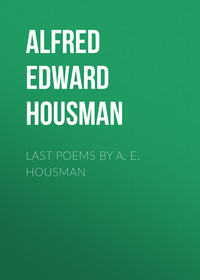Kitobni o'qish: «Last Poems by A. E. Housman»
Shrift:
I publish these poems, few though they are, because it is not likely that I shall ever be impelled to write much more. I can no longer expect to be revisited by the continuous excitement under which in the early months of 1895 I wrote the greater part of my first book, nor indeed could I well sustain it if it came; and it is best that what I have written should be printed while I am here to see it through the press and control its spelling and punctuation. About a quarter of this matter belongs to the April of the present year, but most of it to dates between 1895 and 1910.
September 1922
We'll to the woods no more,
The laurels are all cut,
The bowers are bare of bay
That once the Muses wore;
The year draws in the day
And soon will evening shut:
The laurels all are cut,
We'll to the woods no more.
Oh we'll no more, no more
To the leafy woods away,
To the high wild woods of laurel
And the bowers of bay no more.
I. THE WEST
Beyond the moor and the mountain crest
—Comrade, look not on the west—
The sun is down and drinks away
From air and land the lees of day.
The long cloud and the single pine
Sentinel the ending line,
And out beyond it, clear and wan,
Reach the gulfs of evening on.
The son of woman turns his brow
West from forty countries now,
And, as the edge of heaven he eyes,
Thinks eternal thoughts, and sighs.
Oh wide's the world, to rest or roam,
With change abroad and cheer at home,
Fights and furloughs, talk and tale,
Company and beef and ale.
But if I front the evening sky
Silent on the west look I,
And my comrade, stride for stride,
Paces silent at my side,
Comrade, look not on the west:
'Twill have the heart out of your breast;
'Twill take your thoughts and sink them far,
Leagues beyond the sunset bar.
Oh lad, I fear that yon's the sea
Where they fished for you and me,
And there, from whence we both were ta'en,
You and I shall drown again.
Send not on your soul before
To dive from that beguiling shore,
And let not yet the swimmer leave
His clothes upon the sands of eve.
Too fast to yonder strand forlorn
We journey, to the sunken bourn,
To flush the fading tinges eyed
By other lads at eventide.
Wide is the world, to rest or roam,
And early 'tis for turning home:
Plant your heel on earth and stand,
And let's forget our native land.
When you and I are split on air
Long we shall be strangers there;
Friends of flesh and bone are best;
Comrade, look not on the west.
II
As I gird on for fighting
My sword upon my thigh,
I think on old ill fortunes
Of better men than I.
Think I, the round world over,
What golden lads are low
With hurts not mine to mourn for
And shames I shall not know.
What evil luck soever
For me remains in store,
'Tis sure much finer fellows
Have fared much worse before.
So here are things to think on
That ought to make me brave,
As I strap on for fighting
My sword that will not save.
III
Her strong enchantments failing,
Her towers of fear in wreck,
Her limbecks dried of poisons
And the knife at her neck,
The Queen of air and darkness
Begins to shrill and cry,
'O young man, O my slayer,
To-morrow you shall die.'
O Queen of air and darkness,
I think 'tis truth you say,
And I shall die to-morrow;
But you will die to-day.
IV. ILLIC JACET
Oh hard is the bed they have made him,
And common the blanket and cheap;
But there he will lie as they laid him:
Where else could you trust him to sleep?
To sleep when the bugle is crying
And cravens have heard and are brave,
When mothers and sweethearts are sighing
And lads are in love with the grave.
Oh dark is the chamber and lonely,
And lights and companions depart;
But lief will he lose them and only
Behold the desire of his heart.
And low is the roof, but it covers
A sleeper content to repose;
And far from his friends and his lovers
He lies with the sweetheart he chose.
V. GRENADIER
The Queen she sent to look for me,
The sergeant he did say,
'Young man, a soldier will you be
For thirteen pence a day?'
For thirteen pence a day did I
Take off the things I wore,
And I have marched to where I lie,
And I shall march no more.
My mouth is dry, my shirt is wet,
My blood runs all away,
So now I shall not die in debt
For thirteen pence a day.
To-morrow after new young men
The sergeant he must see,
For things will all be over then
Between the Queen and me.
And I shall have to bate my price,
For in the grave, they say,
Is neither knowledge nor device
Nor thirteen pence a day.
Yosh cheklamasi:
0+Litresda chiqarilgan sana:
07 may 2019Hajm:
23 Sahifa 1 tasvirMualliflik huquqi egasi:
Public Domain